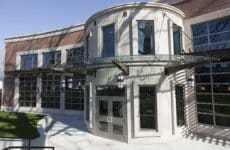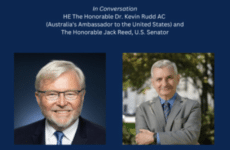By: Nikole Wohlmacher- Mosaic Staff Writer
On October 16, renowned author, educator, and journalist, Dr. Peter Steinfels, gave a lecture at the university about the relationship between faithful citizenship and morality, at Salve Regina University in Newport, R.I., as a segue into the second Presidential debate between Mitt Romney and Barrack Obama, on Tuesday, November 6.
Community members, students, and faculty convened at Salve Regina’s Bazarsky lecture hall to hear Dr. Steinfels lecture, “Faithful Citizenship in a Partisan World.” In the lecture, Dr. Steinfels addressed how Christian citizenship, faithfulness, morality, conscience, and prudence should be taken into consideration when voting for political leaders.
The audience slowly trickled in, filling two-thirds of the lecture hall. After a short introduction by Dr. Anthony LoPresti, an associate professor and chairman of the Religious and Theological Studies Department, the audience quickly learned that Dr. Steinfels is a senior religion correspondent at the New York Times, where he created a bi-weekly column on religion and ethics. He was also the founder of the Fordham Center on Religion and Culture and a recipient of the Laetare Medal from Notre Dame in 2003.
Dr. Steinfels, a graduate of Columbia University, said people need to expand their views about the duties of a citizen. To him, citizenship is viewed as a civic responsibility, not just a vote on election day. “The duties of a citizen in a partisan world are demanding,” said Dr. Steinfels.
Dr. Steinfels believes citizenship is an all year around responsibility. In his opinion, one should take part in political debate, join civil organizations, or make campaign contributions. “Citizens must understand they have an obligation to participate,” he said. Christian citizens have a moral duty to uphold their values as faithful citizens by “drawing on depths of life and love,” according to Dr. Steinfels.
Dr. Steinfels advises the audience to use prudence in their decision to choose a political party. “We don’t vote for issues, we vote for candidates-and they come in different mixes,” said Dr. Steinfels.
Dr. Steinfels’ lecture garnered a lot of intrigue and response, especially from Salve students. One of these students was Jess Lovell, a Salve sophomore studying Secondary Education and English. “My religious views influence many of my decisions,” said Lovell. “But my decisions aren’t based solely on them.” Further expanding upon this statement, Lovell explained that she believed the lecture was perplexing, but a good way to lead into the Presidential debate.
In the past, President Obama spoke about citizenship versus the citizen. Dr. Steinfels connected his speech to Obama’s reference that a citizen is more than a voter. Citizenship is when someone actively participates and informs themselves on political issues throughout the year, in Dr. Steinfels mind. A faithful citizen is one that follows the laws and their own beliefs. Faithful citizens he says, should keep in mind their morality, relying on their conscience for reasoning, and prudence to guide their actions. He compares these ideas to the lenses at an eye doctor, which help one focus and improve their vision. Unifying citizenship, faithfulness, morality, conscience, and prudence in our minds “will improve our decisions in years to come,” said Dr. Steinfels.
Dr. Steinfels impressed both students and faculty alike with his words of wisdom and knowledge. “He gave good food for thought, not just for Catholics, but for anyone who is voting, when neither candidate lines up perfectly with their views,” said Dr. Lopresti, the chair of the Religious and Theological Studies Department at Salve Regina.
Dr. Steinfels kept a discussion on heavy topics, including opinions on abortion and sexuality, easygoing by inserting humorous jokes about his wish to rewrite official documents. Some audience members did not stick around to watch the debate, leaving after hearing Dr. Steinfels lecture.
The Pell Center for International Relations and Public Policy, Religious and Theological Studies Department, and the Mercy Center sponsored Dr. Steinfels lecture, open to the public, in O’Hare Academic Center. The lecture led to inquisitive discussion among the audience. With the upcoming election, citizens who attended the lecture will have their religious views in mind when filling out their ballot.














